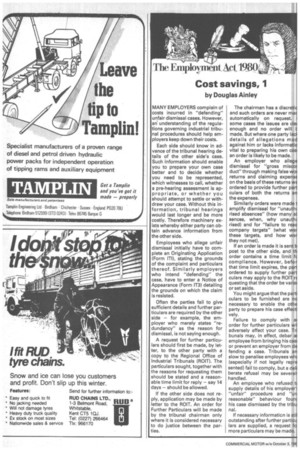Cost savings, 1
Page 30

If you've noticed an error in this article please click here to report it so we can fix it.
by Douglas Ainley
MANY EMPLOYERS complain of costs incurred in "defending" unfair dismissal cases. However, an understanding of the regulations governing industrial tribunal procedures should help employers keep down their costs.
Each side should know in advance of the tribunal hearing details of the other side's case. Such information should enable you to prepare your own case better and to decide whether you need to be represented, which witnesses to call, whether a pre-hearing assessment is appropriate, or whether you should attempt to settle or withdraw your case. Without this information, tribunal hearings would last longer and be more costly. Therefore machinery exists whereby either party can obtain advance information from the other side.
Employees who allege unfair dismissal initially have to complete an Originating Application (Form ITI), stating the grounds of the complaint and particulars thereof. Similarly employers who intend "defending" the case, have to enter a Notice of Appearance (Form IT3) detailing the grounds on which the claim is resisted.
Often the parties fail to give sufficient details and further particulars are required by the other side — for example, the employer who merely states "redundancy" as the reason for dismissal, is not saying enough.
A request for further particulars should first be made, by letter, to the other party with a copy to the Regional Office of Industrial Tribunals (ROIT). The particulars sought, together with the reasons for requesting them should be stated and a reasonable time limit for reply — say 14 days — should be allowed.
If the other side does not reply, application may be made by letter to the ROIT. An order for Further Particulars will be made by the tribunal chairman only where it is considered necessary to do justice between the parties.
The chairman has a discretic and such orders are never mac automatically on request. I some cases the issues are de' enough and no order will t made. But where one party lad, details of allegations mad against him or lacks informatio vital to preparing his own cosi an order is likely to be made.
An employer who allege dismissal for "gross miscot duct" through making false woi returns and claiming expense on the basis of these returns we ordered to provide further part culars of both the returns an the expenses.
Similarly orders were made t amplify dismissal for "unauthc rised absences" (how many at sences, when, why unauthc rised) and for "failure to reac company targets" (what wer these targets, and how wer they not met).
If an order is made it is sent b post to the other side, and th order contains a time limit fc compliance. However, befor that time limit expires, the part ordered to supply further part culars may apply to the ROIT rt questing that the order be vane' or set aside.
You might argue that the parti culars to be furnished are no necessary to enable the othe party to prepare his case effecti vely.
Failure to comply with al order for further particulars wil adversely affect your case. Tri bunals may, in effect, debar au employee from bringing his casi or prevent an employer from de fending a case. Tribunals an slow to penalise employees wht (especially if not legally repre sented) fail to comply, but a deli berate refusal may be severe', handled.
An employee who refused tt supply details of his employer' "unfair" procedure and "un reasonable" behaviour fount his case dismissed by the tribu nal.
If necessary information is stil outstanding after further particu lars are supplied, a request fo more particulars may be made.
















































